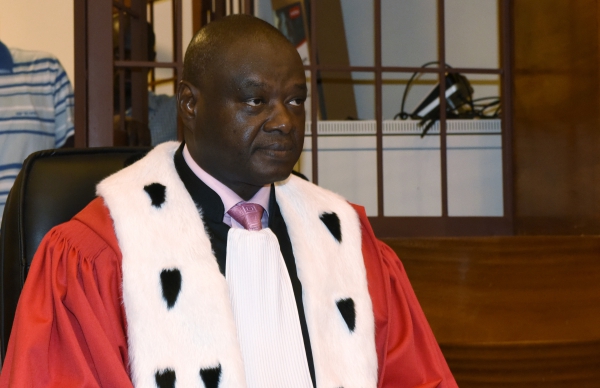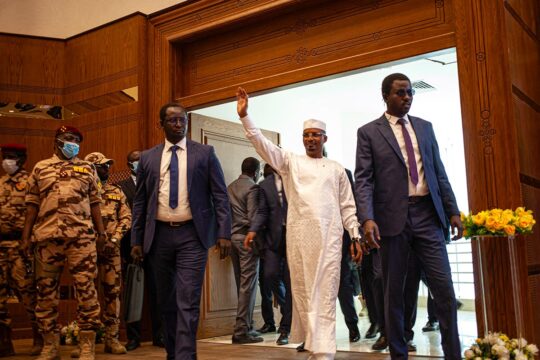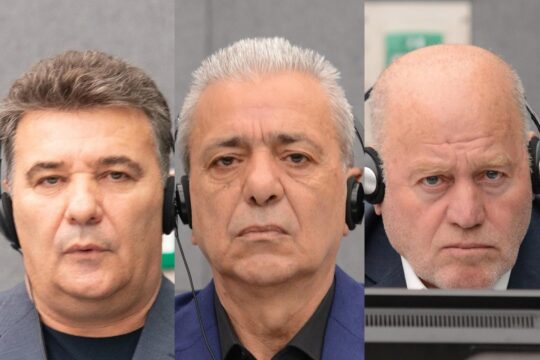After a long fight by victims of Hissène Habré, the former Chadian dictator was finally brought to justice, convicted and sentenced to life in jail on May 30, 2016, by the Extraordinary African Chambers (EAC) in Senegal, for war crimes, crimes against humanity and torture. He has appealed. In an interview with JusticeInfo, EAC Prosecutor Mbacké Fall hails the Court’s verdict and hopes this judgment will send a clear signal to any African leaders who commit grave violations of their citizens’ rights.
JusticeInfo: What is your reaction to this judgment?
Mbacké Fall: As the Prosecutor, I asked the Court to recognize the guilt of the Accused and sentence him to life in prison. So I am of course proud that the Court did this.
JusticeInfo: Can this trial serve as an example? Could it serve as an example to bring other dictators to justice?
MF: This trial sets an example for African leaders who violate human rights and international humanitarian law. It is bound to make them think twice, whether they are currently in power and want to stay there by committing such crimes or they are trying to get to power by illicit means like grave violations of human rights.
JusticeInfo: Do you think it is preferable that Africans be tried by Africans, and if so, why?
MF: Article 17 of the Rome Statute (founding treaty of the International Criminal Court, ICC) enshrines the principle of complementarity, which gives this possibility, that Africans be tried by Africans. It is up to States to assume their responsibilities. The ICC can only intervene if African States are unwilling or unable to do so. So it is preferable that Africans try Africans, and it shows we are taking up our responsibilities, that we are able to try crimes against humanity.
JusticeInfo: The role of civil parties in this case has been much talked about. Did you work with them, or do you think you had different interests?
MF: It was the civil parties’ trial. They had waged a 25-year campaign. They even went to Belgium to get justice, but Senegal refused to extradite Hissène Habré. And so finally Senegal had to assume its responsibilities, especially after the International Court of Justice ordered it to do so. The civil parties were not just participants in the trial, they provided a lot of evidence that corroborated other evidence such as the reports of NGOs like Human Rights Watch, Amnesty International and the National Inquiry Commission in Chad. The relative lack of differences can be explained by the time that has passed. Victims cannot remember everything, and sometimes emotions played a part. But overall, we worked together, and that was very positive.
JusticeInfo: How do you think this trial affects Senegal’s image in the world? Might the principle of universal jurisdiction allow it to try other people?
MF: Given the feedback, I think we can say that the international community has appreciated Senegal’s role in the trial of Hissène Habré. Senegal can now try international crimes whatever the nationality of the suspected perpetrators. Any foreigner can be prosecuted in Senegal for international crimes. That is possible after the 2007 reform of the Penal Code, provided one of the victims resides in Senegal or Senegal requests extradition (of the suspect) or if the suspect is arrested in Senegal. It’s a big step forward, so even if the Extraordinary African Chambers disappear, Senegal can still prosecute a foreigner suspected of committing international crimes abroad against foreigners.
JusticeInfo: What happens next in this trial? And what is the future of the EAC?
MF: The mandate and duration of the EAC are limited in time. A decision on requests for reparations is expected in July, but Habré’s appeal against his conviction means we are going to have more hearings, this time before the Appeals Chamber. Its decision will be final. Once the appeals verdict has been handed down, the EAC’s work will be finished. Having said that, the EAC as a whole could serve as a model in Africa for the creation of special jurisdictions to tackle impunity.
JusticeInfo: How do you react to those who say you should also have gone after Idriss Deby? Was there any political pressure?
MF: No, not at all. Our work was based on documents and victims’ complaints. At no point was Déby directly accused. Even if there had been good evidence implicating him in a crime, his immunity as Head of State would have meant he could not be prosecuted at this time. The Statute of the EAC did not provide for lifting the immunity of sitting Presidents, unlike the Statute of Rome (founding treaty of the ICC) whose Article 27-2 says: “Immunities or special procedural rules which may attach to the official capacity of a person, whether under national or international law, shall not bar the Court from exercising its jurisdiction over such a person”.
JusticeInfo: How was cooperation with the Chadian government? Did the hastily organized trial in N'Djamena of suspected Habré accomplices take away from your case or your investigations?
MF: Yes, and we denounced this. We would have liked that the international character of the EAC take precedence over national jurisdictions. Chad is a member of the African Union and bound by the judicial cooperation agreement between Senegal and Chad. That is why we asked that the EAC be accorded precedence with regard to prosecuting international crimes committed between June 7, 1982 and December 1, 1990. But Chad considered that it could not extradite the people wanted by the EAC and held in N'Djamena. This refusal to transfer Saleh Younouss and Mahamat Djibrin, both former top officials of Habré’s political police the DDS, was an obstacle to the manifestation of the truth. These people who were close to Habré could have given us more information about the system that was in place and their relations with their boss. That would no doubt have damaged his strategy of silence. The three other fugitives have not been caught, despite international arrest warrants against them. But still, we had Bandjim (Bandoum Bandjim, top DDS official who confessed), who gave us his version of the facts, and that was enough for us.
JusticeInfo: What were the most frustrating and the most satisfying moments for you in this case?
MF: The biggest frustration for me was not getting the two people who were tried in Chad. Also, on the procedural front we had delays caused by difficulties in cooperation with Chad: visa problems, lack of passports, health problems etc. Good cooperation is necessary if universal jurisdiction is to work effectively.
The verdict remains the biggest satisfaction for me as Prosecutor, because the Court followed what I had asked for. During the trial there were many emotional moments, the civil parties expressed themselves with open hearts. I am thinking especially of the women victims of sexual violence who testified, or those who told how they thought they would never get out of jail alive and see their loved ones again. Once as we were watching videos, one of the victims recognized herself in it and cried out “That’s me, that’s me!” She had become unrecognizable. She said she was almost dead, but fortunately the prisons were opened 48 hours later. We also had testimony from a mixed race man arrested and accused of being Libyan, who survived the most terrible treatment in jail.






